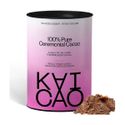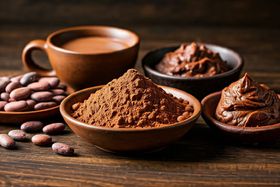What is Theobromine? Exploring its Health Benefits in Cacao
Experience the transformative power of ceremonial cacao as we explore the science behind theobromine and its role in promoting holistic health
Updated March 10, 2025

The term "superfood" is used so often in wellness circles that it has lost much of its meaning. But beyond the buzzwords and trends, one food truly lives up to the hype—cacao.
Thanks to its potent active compound, theobromine, this ancient food offers more than just indulgence; it provides a natural way to boost health and wellness seriously.
» Experience the benefits of theobromine with ceremonial cacao
What is theobromine?
Theobromine belongs to the methylxanthine family of compounds, sharing chemical similarities with caffeine and theophylline. But, what sets theobromine apart is its gentler, more sustained effect on the human body.
Research suggests that theobromine's molecular structure allows it to uniquely interact with our body's systems, particularly affecting our cardiovascular and nervous systems. [1]
The name derives from Theobroma cacao, the scientific name for the cacao tree, which literally translates to "food of the gods."
» Explore how traditional chocolate is made
The health benefits of theobromine
Recent scientific investigations suggest several potential health benefits associated with theobromine consumption. While preliminary findings are promising, many effects are still under investigation and require additional research for definitive confirmation.
Heart health
- Theobromine acts as a natural vasodilator, helping to widen blood vessels and potentially reduce blood pressure.
- Regular consumption may help improve lipid profiles, potentially supporting heart health through multiple pathways.
- The compound's ability to enhance blood flow may improve oxygen delivery throughout the body.
Brain function and mood enhancement
- The compound demonstrates potential nootropic properties, possibly enhancing focus and mental clarity through its interaction with adenosine receptors.
- Regular consumption may improve mood and well-being, with potential mild mood-elevating effects.
- Unlike caffeine, theobromine's effects are more subtle and longer-lasting, providing sustained cognitive support.
» Find out how the antioxidants in cacao improve your health
Metabolic support and natural diuretic properties
- Theobromine functions as a natural diuretic, helping maintain healthy fluid balance in the body.
- The compound may support metabolic health through various mechanisms, including improved insulin sensitivity.
- Its effects on fluid balance may help reduce mild edema and bloating naturally.
It's important to note that these effects are still being explored. More rigorous clinical trials are needed to understand theobromine's impact on human health fully. Nonetheless, the current research is promising and offers a glimpse into the potential of this natural compound.
What foods contain theobromine?
While theobromine appears in various natural sources, its concentration varies significantly. Here are the main sources where you can find this beneficial compound:
- Dark chocolate and raw cacao are the richest natural sources of theobromine, with studies showing that a 100-gram bar of dark chocolate (70–85% cacao) can contain approximately 883 mg of theobromine. [2]
- Ceremonial cacao is a particularly concentrated form, typically providing around 300mg per serving, making it ideal for obtaining an optimal daily intake.
- Tea leaves, particularly yerba mate and green tea, contain modest amounts of theobromine, though much less than cacao products.
- Coffee beans contain trace amounts of theobromine, contributing to their complex chemical profile.
» Indulge in the unique, velvety smooth taste of camel milk chocolate
Unlocking the potential of theobromine with cacao
Ceremonial cacao is a particularly meaningful way to incorporate theobromine into your wellness routine. This traditional preparation method maximizes theobromine's bioavailability while honoring the sacred history of cacao consumption.
The careful processing and preparation of ceremonial cacao help preserve the full spectrum of beneficial compounds, creating a synergistic effect that may enhance theobromine's benefits.
How much theobromine should you take a day?
The recommended intake of theobromine typically ranges from 300–600mg daily, aligning perfectly with a serving of KAICAO ceremonial cacao at approximately 300mg. However, individual tolerance and sensitivity can vary significantly. Here are essential considerations for consumption:
- Start with smaller amounts to assess your tolerance, particularly if you're sensitive to stimulants.
- Consider timing your consumption earlier in the day to avoid any potential sleep disruption.
- Combine theobromine-rich foods with a balanced diet to optimize absorption and benefits.
Although theobromine has many benefits, consuming it in moderation is crucial to avoid potential side effects and maximize its positive impact on health.
» Discover the benefits of indulging in ceremonial cacao
A holistic approach to health
Theobromine strongly reminds us that wellness is not about quick fixes or extreme measures but about understanding and working with our body's natural systems. It helps us experience a gentler, more sustained approach to energy, mental clarity, and overall health.
Whether through a morning cup of ceremonial cacao or indulging in dark chocolate, we can tap into ancient wisdom that sees nutrition as a holistic, transformative experience that nourishes not just our body but our mind and spirit.
» Unlock the potential of theobromine with ritual cacao from KAICAO
Disclaimer: The chocolate information provided by Kaicao is intended for educational purposes related to chocolate products. We encourage you to embrace the chocolate experience, savor each moment, and explore the world of chocolate with passion.
FAQs
Is theobromine bad for sleep?
While theobromine is a stimulant, it's generally considered less disruptive to sleep than caffeine. Unlike caffeine, which can cause jitters and difficulty falling asleep, theobromine tends to have a more calming effect.
However, consuming large amounts of theobromine, especially close to bedtime, could still interfere with sleep quality. It's important to note that individual sensitivity to stimulants varies, so it's best to moderate your intake of theobromine-rich foods, such as dark chocolate, and observe how it affects your sleep patterns.
Is theobromine a laxative?
While theobromine is not a traditional laxative, it can have a mild laxative effect in some individuals, particularly when consumed in larger quantities. This effect is more pronounced in people who are sensitive to the substance.
However, it's important to note that theobromine's laxative effect is generally mild and not as potent as that of specific laxative medications.
Who should not take theobromine?
While theobromine is generally safe for most people, there are certain individuals who should exercise caution or avoid it altogether.
People with underlying health conditions, such as heart problems or kidney disease, should consult with their healthcare provider before consuming theobromine.
Additionally, pregnant women and breastfeeding mothers should also consult with their healthcare provider, as there is limited research on the safety of theobromine during pregnancy and breastfeeding.
Is theobromine addictive?
No, theobromine is not considered addictive. Unlike caffeine, which can lead to physical and psychological dependence, theobromine does not have the same addictive properties. It does not cause withdrawal symptoms or compulsive cravings when consumption is reduced or stopped.






